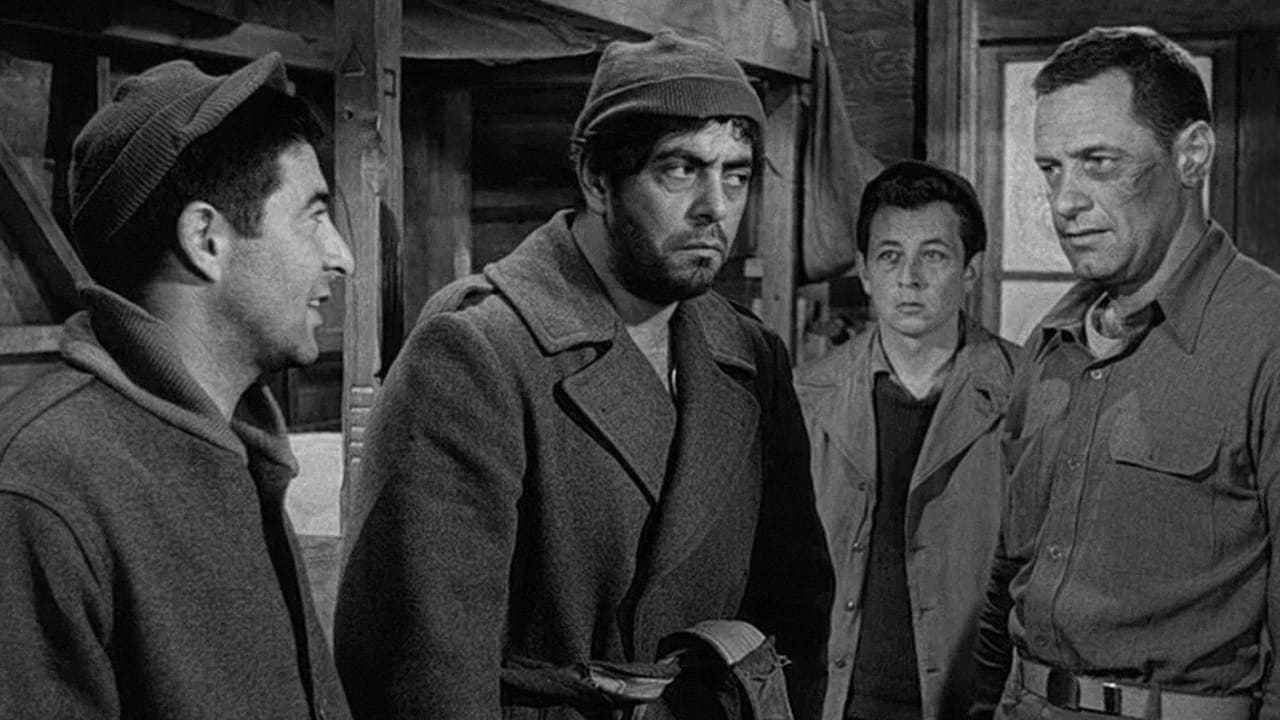

"Stalag 17" is about 30 minutes of compelling film starring William Holden padded out with about 90 minutes of strained "comedy." Holden plays an inmate in a German prison camp during WWII who comes under suspicion by his fellow prisoners of being a spy because of his "every man for himself" attitude. For about an hour and a half, scenes of the prisoners being grumpy with him are interspersed with long segments of superfluous antics which make being an inmate of a German POW prison seem about as serious as being away at summer camp. Then, in the film's last half hour, Holden decides to find out who the spy really is, and does so without breaking a sweat.Holden's entire performance consists of attitude, which is exactly what the character calls for, but it's not the stuff of an Oscar-winning performance, especially because he seems very much like a supporting character. I wasn't timing things with a stopwatch, but it felt like Robert Strauss, who was nominated for Best Supporting Actor as the lunkhead Animal, had more screen time. He's one of the actors included for comic relief, but man does he wear out his welcome early on, as do all of the other actors who are there only to provide what we are supposed to think are hysterical hijinks. The film would feel like an inferior knock off of "MASH" if it hadn't come out first. Billy Wilder joined Holden and Strauss at the 1953 Oscars as a nominee for Best Director. Grade: B-
... View MoreYou get William Holden who was a premium movie star at the time with a good story and who doesn't like a prisoner movie? In this case, prisoners of war during the Nazi reign of terror only the Nazis are not depicted as real bad guys just the enemy for this films purposes. Apparently they wanted to keep the whole thing light-hearted and they succeeded. The movie informs and entertains as a story unfolds about a barracks who had a spy. Good memorable scenes throughout the movie and a really butterfly flutter in the stomach ending that turns into chills and deep satisfaction then does an encore. What more could a film viewer ask for? I did a small bowl of sunflower seeds chomping away watching and enjoying. The movie manages to hold your attention as it slowly grows and then grips making you....
... View MoreAs mentioned by other reviewers, prisoner-of-war movies would seem a natural venue for film noir. Certainly Billy Wilder's cynically moody Stalag 17 (1953) (available on a 10/10 Paramount DVD) qualifies, despite (or possibly because of) its unpleasantly realistic comic relief from Robert Strauss and company. William Holden won and thoroughly deserved the year's Best Actor award for his biting portrait of the amorally self-serving Sefton, while Otto Preminger (in his last on-screen movie role (before concentrating on producing and directing) captures our second-most degree of attention (Holden, of course, is number one) as the camp colonel.Other famous POW movies tend to be more light-hearted as well as intentionally escapist (in both senses of that word).If only for William Holden's performance, "Stalag 17" certainly rates as a must-see movie!
... View More"Stalag 17" is a drama movie which is combined with some historic events about World War II. In this movie we watch a man who is suspected to be a spy because of the death of two American prisoners who died in their try to escape from a German camp.I had many expectations of this movie and I have to admit that I was not covered from it. The only thing that I really enjoyed was the interpretation of William Holden who played as Sgt. J.J. Sefton (won the Oscar for Best Actor in a Leading Role) and I believe that this interpretation it's one of the best of him. About the storyline and the plot I do not have to say much, it's simple with no many surprises and I believe that if you have seen some movies with about the same story then you will know what will happen to the movie before happen.Lastly I have to say that "Stalag 17" is a movie just to spend your time and nothing more but in my opinion the most interesting part in this movie is the interpretation of William Holden and nothing else. Unfortunately If you have many expectations from this movie then I believe that you will also not been covered from it.
... View More